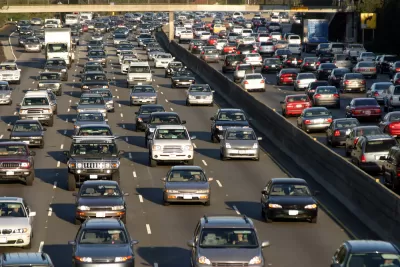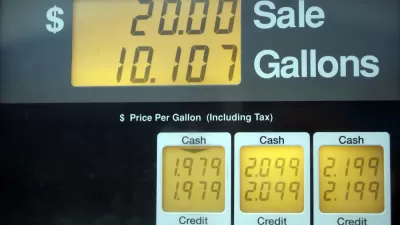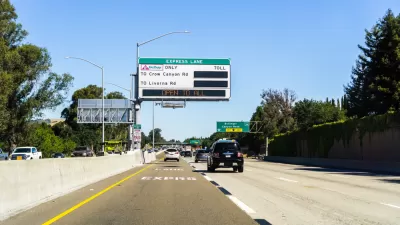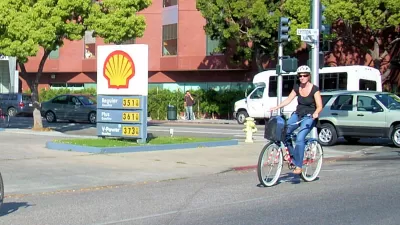In potentially the most important transportation ballot measure in the state since 1990, the last time residents voted on the gas tax, Californians were deciding whether to repeal fuel taxes and vehicle registration fees approved last year.

It wasn't even close: Over 55 percent of Californians on Tuesday rejected a partisan attempt to repeal a comprehensive transportation funding package, the Road Repair and Accountability Act of 2017, that took the legislature two years to approve with a two-thirds majority.
California has the nation's second highest gas prices ($3.74 per gallon) after Hawaii, a dollar higher than the national average, and the nation's second highest state gas tax at 55.53 cents per gallon after Pennsylvania.
Proposition 6: "Voter Approval for Future Gas and Vehicle Taxes and 2017 Tax Repeal Initiative," would have reduced the state gas tax by 12-cents per gallon, diesel excise tax by 20 cents per gallon, and eliminated new vehicle registration fees included in the Road Repair and Accountability Act of 2017, all of which are projected to bring in over $5 billion annually to repair the state's deteriorating roads, bridges, and public transit.
Opponents spent heavily to gather signatures to place the repeal on the ballot as a means to promote Republican turn-out at the midterm elections.
"Republicans in California’s congressional delegation, including Reps. Kevin McCarthy, Devin Nunes, and Mimi Walters, see the repeal effort as a way to energize the party’s voters," reported Bloomberg Environment.
"At one point it appeared the initiative could be a defining issue for the state’s midterm election," reports Patrick McGreevy for the Los Angeles Times (source article.) Initially, it led in the polls.
The repeal effort gained momentum in June when backers succeeded in recalling state Sen. Josh Newman (D-Fullerton) over his vote for the higher taxes. Three weeks later, the repeal measure qualified for the ballot when those behind it turned in more than 585,000 signatures of registered voters.
But then the money from deep-pocketed Republicans dried up as GOP leaders shifted their attention to helping their party’s candidates in close congressional and state legislative races.
Repeal proponents, led by former San Diego City Councilman Carl DeMaio, raised $5 million but were "eclipsed by the $47 million brought in by initiative opponents from the construction industry, organized labor and Democrats," adds McGreevy.
[Full disclosure: This correspondent made a small contribution to TransForm, an Oakland-based non-profit, that also mounted a campaign against the repeal.]
More than a repeal: Prop. 6 would have prevented the legislature from doing its job.
Since Feb. 15, 2013, when Republican Gov. Matt Mead of Wyoming signed a 10-cents per gallon gas tax hike, legislatures in 27 states, mostly Republican-controlled, "have raised or reformed their gas taxes," reported Carl Davis, research director of the Tax Foundation, on May 22. Two Republican-controlled state legislatures, Nebraska and South Carolina, managed to override vetoes of gas tax increase legislation by their Republican governors.
Prop. 6, an initiated constitutional amendment, would change the state's constitution to "require voter approval (via ballot propositions) for the California State Legislature to impose, increase, or extend fuel taxes or vehicle fees in the future," per Ballotpedia. In fact, that's the route the last gas tax hike took: Prop. 111 on June 1990: a 9-cents per gallon gas tax increase, placed on the ballot after the passage of Senate Constitutional Amendment 1 in 1989.
Twenty-eight years later, the legislature managed to directly implement a 12-cents per gallon increase with the passage of Senate Bill 1 in April 2017 which required a two-thirds vote. Prop. 6 would have added an entirely new layer of "taxpayer protection" in the form of a Taxpayers Bill of Rights for transportation taxes and fees, giving voters the final say, similar to what exists in Colorado and Missouri. More on those states later...
Related:
- Election 2018 Results: Local and State Land Use, Transportation, Housing, and Infrastructure
-
Voters in Four States to Decide on Transportation Sales and Fuel Taxes, September 28, 2018Californians will determine whether to repeal recent fuel tax and user fee increases; Missourians to vote on a 10-cent gas tax hike over 4 years; Coloradans whether to hike the sales tax, and the most interesting measure will be decided in Utah.
FULL STORY: California voters reject repeal of state gas tax and vehicle fee increase

Planetizen Federal Action Tracker
A weekly monitor of how Trump’s orders and actions are impacting planners and planning in America.

Maui's Vacation Rental Debate Turns Ugly
Verbal attacks, misinformation campaigns and fistfights plague a high-stakes debate to convert thousands of vacation rentals into long-term housing.

San Francisco Suspends Traffic Calming Amidst Record Deaths
Citing “a challenging fiscal landscape,” the city will cease the program on the heels of 42 traffic deaths, including 24 pedestrians.

Defunct Pittsburgh Power Plant to Become Residential Tower
A decommissioned steam heat plant will be redeveloped into almost 100 affordable housing units.

Trump Prompts Restructuring of Transportation Research Board in “Unprecedented Overreach”
The TRB has eliminated more than half of its committees including those focused on climate, equity, and cities.

Amtrak Rolls Out New Orleans to Alabama “Mardi Gras” Train
The new service will operate morning and evening departures between Mobile and New Orleans.
Urban Design for Planners 1: Software Tools
This six-course series explores essential urban design concepts using open source software and equips planners with the tools they need to participate fully in the urban design process.
Planning for Universal Design
Learn the tools for implementing Universal Design in planning regulations.
Heyer Gruel & Associates PA
JM Goldson LLC
Custer County Colorado
City of Camden Redevelopment Agency
City of Astoria
Transportation Research & Education Center (TREC) at Portland State University
Jefferson Parish Government
Camden Redevelopment Agency
City of Claremont





























